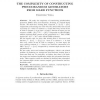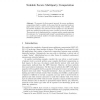ICALP
2011
Springer
12 years 8 months ago
2011
Springer
We give new algorithms for a variety of randomly-generated instances of computational problems using a linearization technique that reduces to solving a system of linear equations...
ICITS
2009
13 years 2 months ago
2009
In this article, we discuss a naive method of randomness reduction for cryptographic schemes, which replaces the required perfect randomness with output distribution of a computat...
CC
2005
Springer
13 years 4 months ago
2005
Springer
We study the complexity of constructing pseudorandom generators (PRGs) from hard functions, focussing on constant-depth circuits. We show that, starting from a function f : {0, 1}l...
ECCC
2007
13 years 4 months ago
2007
Abstract: We give an explicit construction of a pseudorandom generator against lowdegree polynomials over finite fields. Pseudorandom generators against linear polynomials, known...
ECCC
2010
13 years 4 months ago
2010
We give new pseudorandom generators for regular read-once branching programs of small width. A branching program is regular if the in-degree of every vertex in it is either 0 or 2...
ECCC
2010
13 years 4 months ago
2010
We prove that the pseudorandom generator introduced in [INW94] fools group products of a given finite group. The seed length is O(log n log 1 ), where n the length of the word and...
CRYPTO
2006
Springer
13 years 8 months ago
2006
Springer
We present the first general protocol for secure multiparty computation which is scalable, in the sense that the amortized work per player does not grow, and in some natural settin...
STOC
2010
ACM
13 years 8 months ago
2010
ACM
We give a new construction of pseudorandom generators from any one-way function. The construction achieves better parameters and is simpler than that given in the seminal work of ...


